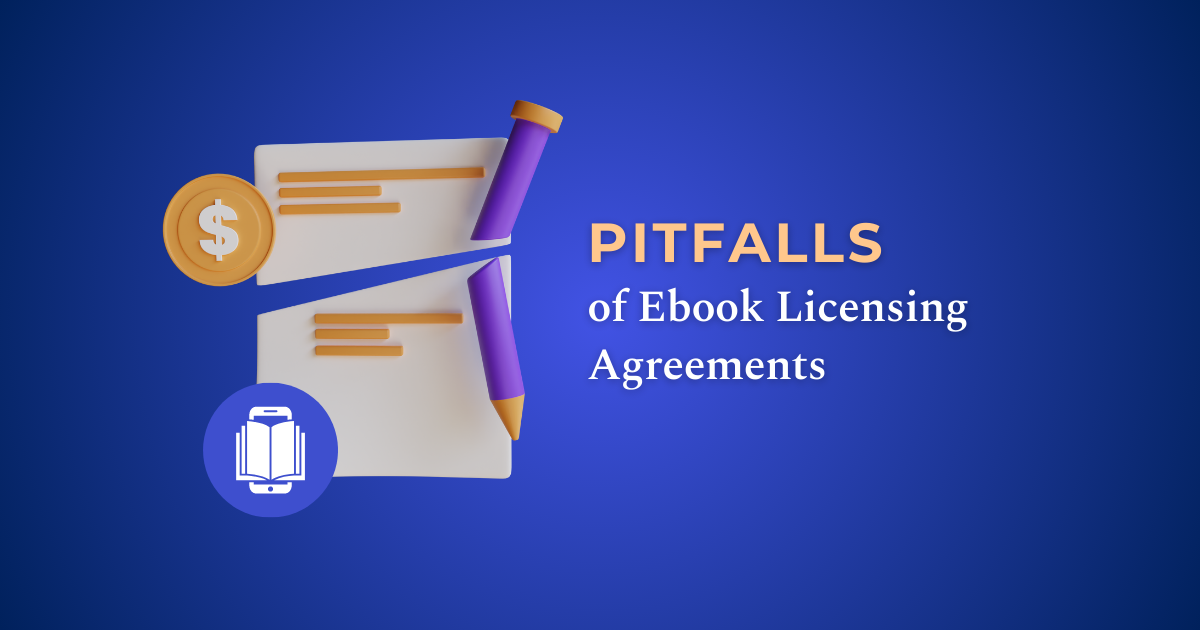How to License Ebooks (+Pitfalls of Ebook Licensing Agreements)

Disclaimer: The information in this article is intended as a general guide to understanding ebook licensing. However, it should not be regarded as legal advice. If you're uncertain about any aspect of copyright law, we strongly recommend consulting with a qualified copyright lawyer.
Signing a contract and finding the right deal could be difficult if you are a newcomer in the publishing industry.
Many say there is no way to negotiate an ebook licensing agreement, but this is not true. You are the copyright owner, the creative mind in the process; without you, there is no content to be read and sold. Do not underestimate this power.
In this article, we are reviewing some pitfalls of ebook licensing agreements: how to read between the lines to achieve better deals for you or your company in the future.
In this article, I go over:
What Is An Ebook License?
An ebook license is an agreement between the copyright owner (typically the author or publisher) and the user (reader or distributor), outlining the specific rights for the digital use of the book. It specifies the conditions under which the ebook can be accessed, copied, shared, or transferred.
Some license models allow the ebook to be used on multiple devices simultaneously, while others may restrict usage to a single device. Similarly, some licenses allow for lending or reselling of the ebook, while others prohibit these activities.
It's important to note that when someone purchases an ebook, they often buy a license to access the content, not ownership of the content itself. This means they must abide by the terms of the license agreement under copyright law, which can be more restrictive than the rights one would have when purchasing a physical book.

License agreements: Printed books vs. Ebooks
The main differences between the licenses of a printed book and an ebook typically lie in distribution, ownership, and usage.
- Distribution
With a printed book, you can lend it to a friend, sell it, donate it, or even rent it out. These activities are permissible under the first-sale doctrine, which stipulates that after a copy of a copyrighted work is lawfully sold, it can be resold, lent, or given away without further permission from the copyright owner. Ebooks, however, are often governed by licenses that restrict these activities. Most ebook licenses prohibit you from lending, reselling, or giving away the ebook.
- Ownership
When you buy a printed book, you own that specific physical copy and can do with it as you wish within legal bounds. Conversely, when you buy an ebook, you often purchase a license to read the book, not the actual ownership of the book itself. This means the rights of the ebook reader are typically more limited, defined by the license agreement, which can vary by publisher or distributor.
- Usage
A printed book can be read anywhere and anytime. You can mark the pages, make notes in the margins, and keep it forever. Ebooks, however, require specific software or devices to read, and the ability to annotate can depend on the platform. Additionally, ebooks can include digital rights management (DRM) restrictions to prevent unauthorized copying or sharing, and the ebook provider may even have the right to remove the ebook from your device under certain circumstances as stipulated in the license agreement.
What Are The Main Types Of Licenses?
The type of license chosen can greatly influence how an ebook is used and accessed and can have significant implications for both the publisher and the end user. The type of licensing agreement used will depend on various factors, including the type of book, the intended audience, and the distribution platform.
Several key types of licensing models are commonly used in the publishing industry, particularly concerning ebooks. These include:
1. Single-User License
This license model allows the ebook to be accessed by a single user at a time. It's similar to a printed book – one copy can be borrowed or used at a time. Libraries often use this model for ebook lending.
2. Multiple-User License
Under this type of license, an eBook can be accessed by multiple users simultaneously. This is often used in academic or institutional settings, where more than one person may need access to the content simultaneously, but it usually is available for a previously set number.
3. Unlimited User License
This is similar to the multiple-user license, but there is no limit on the number of users who can access the ebook simultaneously. This type of license is typically more expensive, but it ensures that the ebook is always available for use.
4. Subscription License
Under this type of license, users have access to a range of ebooks for a set period of time, usually for a monthly or annual fee. Platforms like Amazon's Kindle Unlimited use this model.
5. Perpetual Access License
This license allows the purchaser (often a library or institution) indefinite ebook access. Once the ebook is purchased, users can access it in perpetuity.

How To License An Ebook
As a self-published author, licensing your book provides a way to expand its reach, increase your audience, and generate additional income. There are several steps to follow and consider when deciding to license your book:
1. Understand the types of licensing
The first step is understanding the types of licensing available to you. The type of license you choose will depend largely on your target audience and the distribution platform you're using.
2. Choose your platform
There are various platforms available for self-publishing and distributing your eBook, you can go directly to a retailer such as Amazon KDP or Apple Books, or you can choose a book aggregator like PublishDrive. Each of these platforms has its own licensing agreements. Make sure to read and understand these agreements before you choose a platform to license your book.
3. Set your license terms
After choosing a platform, you need to set the terms of your license. This will include deciding on pricing, geographic restrictions, and whether your book will be available for lending. You'll also need to decide whether to opt for DRM (Digital Rights Management) protection. This helps to prevent unauthorized distribution of your book, but it can also make it less accessible for some readers.
4. Register your copyright
It's crucial to register your book with the U.S. Copyright Office or the relevant authority in your country to become a copyright owner. While copyright is automatically bestowed upon the creation of a work, registering it gives you a public record and stronger legal footing should you need to defend your copyright.
5. Discuss foreign rights
If you want your book to reach an international audience, consider negotiating foreign rights. This will involve translating and adapting your book for different markets. You may need a literary agent or a rights agency to help with this, as it can be a complex process.
6. Monitor your license
Once your book is licensed and published, it's important to monitor your sales and adjust your strategy as necessary. Use the analytics provided by your publishing platform to see how your book is performing and identify any potential issues.
Pitfalls of Publishing Agreements
Publishing agreements can be a minefield for the uninitiated. As a self-published author, it's important to be aware of the potential pitfalls and issues that can arise. Here are some common traps to avoid:
1. Unclear royalty provisions
Ensure you fully understand the royalty calculation and payment methods. Royalty provisions can often be complex and may include hidden costs that reduce your earnings.
Do not only look at nominal value. It is not uncommon to only scan for numbers when reading a contract: you check nominal values, and they look nice, so it is good to go. However, the wording can change everything: if you do not read the agreement thoroughly, you might not receive what you expected.
- Net sales vs. net RRP/SRP
Net sales are calculated based on the real price at which your book is sold. This is fair and simple: your readers pay a certain amount for your book, and the retailers calculate your share.
Net RRP/SRP (recommended/suggested retail price) is based on the price you gave to the retailer. If they have to raise the price to match it to the price tier, you still get your share based on the RRP and might miss out on extra money. However, if the price drops for whatever reason (e.g., for sale), you still get paid based on the RRP and have no losses. Depending on your business strategy, this can work as well. (Read more about pricing strategies here.)
- Retail price vs. net retail price
Always go for the net sales price since VAT/sales tax may differ by country or state.
2. Unclear payment terms
Check in the contract how payment is going to be made. In case of any business transaction, money cannot be transferred without some invoice or written document, so look at who is sending the invoice and when. Is your invoicing monthly or quarterly? Choose a partner with a self-billing service to avoid any administrative burdens but still receive your money on time.
- Based on earnings reports vs. based on receiving the funds from retailers
Earnings reports list all your sales within the month and set a payment date. You have to receive your money by this date regardless of the retailers’ contracts with third parties. On receiving the funds: you will receive your money only after the aggregator is paid. Remember that you cannot track when a partner receives funds from the retailers.
- Higher threshold vs. transaction fees
Lower payment thresholds can be tempting, as you get paid more often. But don’t forget that more often means paying more transaction fees. If you have a lower threshold with more transactions, your cost gets higher.
Many companies do not include exact reporting or payment terms, instead using undefined expressions such as “usually between 30-60 days”. Do not accept blurry terms when it comes to payment rates. Instead, fight for exact numbers.
Look for discrepancies between reporting and invoicing. If you get quarterly reports, look at when you will receive those reports and how invoicing is connected to them.
3. Grant of rights
Keep the rights of your intellectual property. Be cautious about granting exclusive rights to your publisher for an indefinite period. Always negotiate the term and scope of the license. Retain some rights to provide flexibility for future opportunities.
Non-exclusive contracts are what you have to search for when choosing a partner to sell your ebooks. Non-exclusivity means legally selling your books in other stores/platforms. You can grant rights to resell or make small technical changes if necessary for conversion.
Take control of your own content and metadata and be conscious about them in the long term. Never give rights to anyone to
- change the title,
- change the author’s name,
- change the content,
- add own branding.
Be aware of clauses that restrict your book's distribution to specific territories or languages. If the publisher does not have a strong presence in those territories or languages, your book might not reach its full potential.
4. Termination of contract & dispute resolution provisions
Before signing any agreement, it's essential to seek advice from a literary agent or a legal professional specializing in intellectual property and publishing contracts. They can help you understand the terms and implications and negotiate a better deal.
Ensure the contract states how to resolve disputes. This could involve arbitration or mediation procedures, which can be less costly and time-consuming than traditional litigation.
Termination is a challenging and often distressing procedure. Make sure you get your content back. Before you take any action, look at what happens with your intellectual property afterward and how long it will take to part ways.
Your content should be deleted from the servers of your partner and their third parties platforms. Your content should be withdrawn immediately (within a reasonable timeframe for making the technical changes) and should not be longer than the termination deadline.
Delineate & Delegate
Understanding the process of ebook licensing is vital for any self-published author. An ebook license delineates the rights of both parties and is instrumental in safeguarding your work. It's the legal framework that outlines how and where your ebook can be distributed and consumed.
It's also essential to remember that the process of how to license an ebook requires a keen understanding of your rights and the possible channels of distribution. By understanding how ebook licensing works, you are better positioned to maximize your reach and protect your creative rights. Therefore, take time to understand the various aspects of licensing and tailor your approach to meet your individual needs as an author. And then, publish!